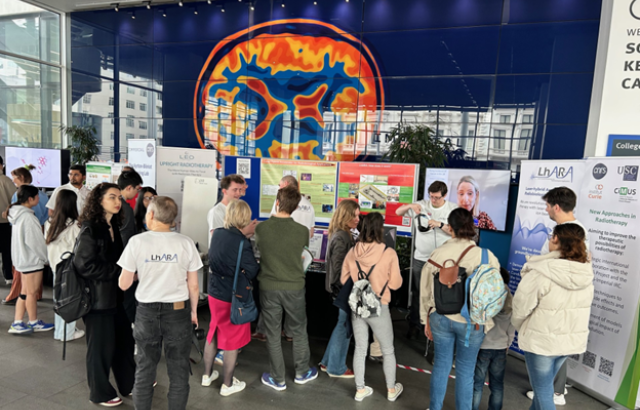Professor Peter Hobson showcases pioneering cancer research at Great Exhibition Road Festival
Professor Peter Hobson recently represented Queen Mary University of London and the cutting-edge LhARA collaboration at the Great Exhibition Road Festival in South Kensington. This annual public science and arts festival, organised by Imperial College London, drew thousands of curious minds, offering a unique platform to engage the public with the very forefront of scientific discovery.

Professor Peter Hobson, a key member of The Laser-hybrid Accelerator for Radiobiological Applications (LhARA) collaboration, attended the LhARA stand discussing the project's aims and exciting potential with an enthusiastic crowd of all ages and backgrounds. "We had about a thousand visitors at our stand over two days, and it was fantastic to talk to so many people about our work," Professor Hobson commented.
At its core, the LhARA collaboration is dedicated to revolutionising radiotherapy for cancer treatment. "The overall project goal is essentially improving radiotherapy," Professor Hobson explained, "by using a different technique than is currently available." He elaborated on the crucial distinction: "Something which has come to the fore is the use of particle beams as opposed to X-rays." While proton therapy is already in use at specialised UK centres in London and Manchester for highly specific applications like eye and brain tumours, LhARA is pushing the boundaries further. The fundamental advantage of particle beams, as Professor Hobson elucidated, is their precision. "The beam goes through the patient and stops at a fairly narrow region." This minimises collateral damage to healthy tissues, a significant improvement over conventional X-rays.
The LhARA project introduces innovative ways to deliver radiation doses. Professor Hobson highlighted the potential to deliver a "complete therapeutic dose in one pulse, or in a thousand very weak shots. The very small beam enables a sophisticated "striping" technique. This method capitalises on a feature of radiobiology, where "the dying cells can kill off healthy cancer cells." This could mean, he added, "you could give perhaps half the dose you would need if you gave it over the whole area, but still with the same therapeutic benefit."
Professor Hobson's personal contribution to this cutting-edge research involves developing a novel optical technique for real-time measurement of radiation dose within cell cultures, working in tandem with an ultrasound-based method using the ion-acoustic effect. "You need a real-time system that says, well, the last pulse we got 1.5 Gray... but we want to give 8 Gray in total, so therefore we adjust and then we then measure again for the next pulse," he clarified. LhARA recently achieved a significant milestone, collecting promising simultaneous ultrasound and light data at a laser-driven accelerator facility in Munich. This crucial step is essential for the accuracy and safety of future therapeutic applications.
While the immediate focus of LhARA remains fundamental research with cell and tissue cultures, the long-term vision is monumental. The ultimate goal is to establish a large-scale research facility, a space comparable to a "typical British mid-size supermarket," where "the ground floor would have the accelerator complex and then the beams would be bent upwards by magnets to the upstairs, which would all be bioscience labs."
Looking ahead, the LhARA collaboration has ambitious plans to share its pioneering work with a wider audience across the UK. "This exhibition is going to tour the UK," Professor Hobson confirmed. With representatives from universities in England, Wales, Scotland, and Northern Ireland, the goal is to ensure the project's impact and reach extend far beyond London. The next stop for the LhARA exhibit will be at the Rutherford Lab in Oxfordshire for their public open day. The collaboration also harbours strong hopes of featuring prominently in the Glasgow Science Festival in 2026.